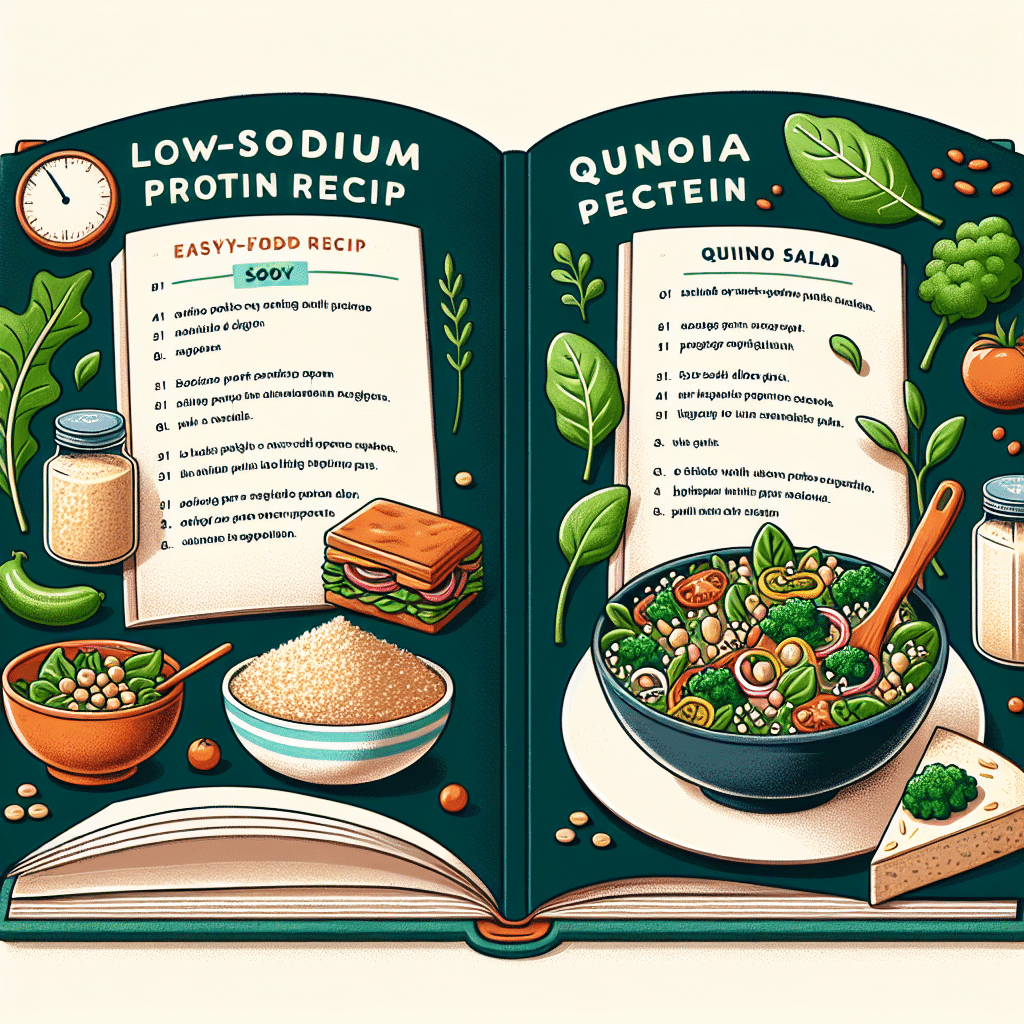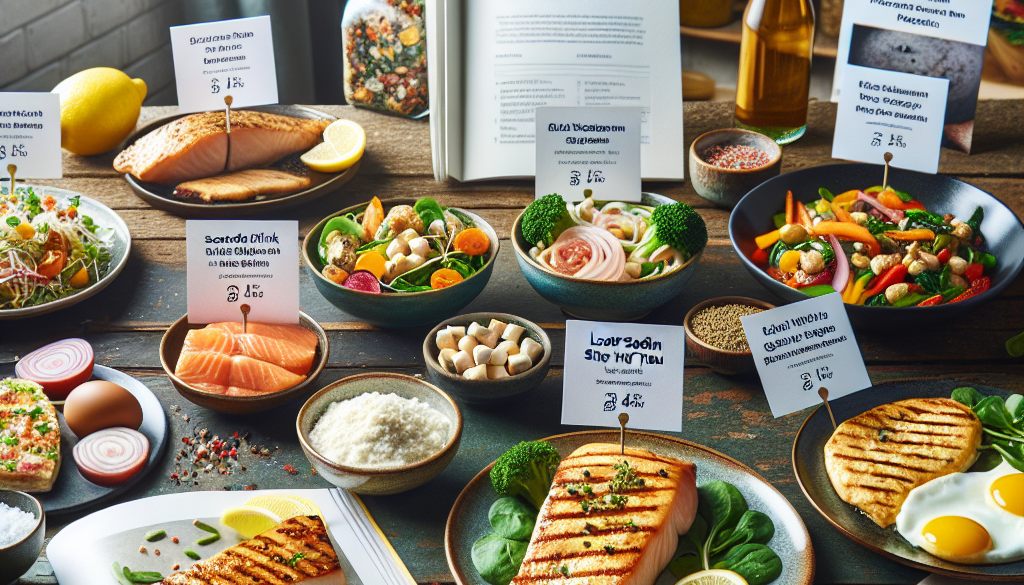Low-Sodium Formulations of Protein Products: Healthier Recipes
-
Table of Contents
- Low-Sodium Protein Products: Crafting Healthier Recipes
- The Health Implications of High Sodium Intake
- Challenges in Low-Sodium Protein Product Formulation
- Innovative Strategies for Low-Sodium Protein Products
- Case Studies and Success Stories
- Health Benefits of Low-Sodium Protein Products
- Consumer Trends and Market Growth
- Conclusion: Embracing Low-Sodium Protein Alternatives
- ETprotein: Your Source for High-Quality Protein Products
Low-Sodium Protein Products: Crafting Healthier Recipes

In recent years, the health and wellness industry has seen a significant shift towards low-sodium diets. This change is driven by a growing awareness of the health risks associated with high sodium intake, such as hypertension and heart disease. As a result, consumers are increasingly seeking out low-sodium alternatives to their favorite protein products. This article explores the importance of low-sodium formulations in protein products, the challenges faced in their development, and the benefits they offer to consumers.
The Health Implications of High Sodium Intake
Excessive sodium consumption is a major health concern globally. The World Health Organization (WHO) recommends a maximum intake of 2,000 milligrams of sodium per day, yet many individuals exceed this limit, often without realizing it. High sodium intake is linked to an increased risk of hypertension, stroke, and other cardiovascular diseases. Reducing sodium in the diet is therefore crucial for maintaining heart health and preventing chronic diseases.
Challenges in Low-Sodium Protein Product Formulation
Creating low-sodium protein products that are both tasty and nutritious can be challenging. Sodium plays a critical role in flavor, preservation, and texture. Manufacturers must find suitable substitutes that meet these needs without compromising the product’s appeal. Here are some common challenges faced in low-sodium product formulation:
- Taste: Sodium chloride, or table salt, is a key flavor enhancer. Finding alternatives that provide a similar taste profile is difficult.
- Preservation: Salt acts as a preservative by inhibiting the growth of bacteria. Low-sodium products may have a shorter shelf life or require alternative preservation methods.
- Texture: In processed meats and other protein products, salt contributes to the binding and textural properties. Replicating these characteristics without salt requires innovative solutions.
Innovative Strategies for Low-Sodium Protein Products
Despite the challenges, food scientists and manufacturers have developed several strategies to reduce sodium content in protein products without sacrificing quality:
- Use of Potassium Chloride: Potassium chloride can replace some of the sodium chloride to maintain flavor while reducing sodium content.
- Flavor Enhancers and Spices: Natural herbs, spices, and flavor enhancers like yeast extracts can help compensate for the reduced saltiness.
- Technological Advances: High-pressure processing and other techniques can improve the texture and shelf life of low-sodium products.
Case Studies and Success Stories
Several companies have successfully launched low-sodium protein products that have been well-received by health-conscious consumers. For example, a leading meat producer reformulated their deli meats to reduce sodium by 30% without compromising taste. Another success story comes from a plant-based protein company that introduced a low-sodium vegan burger, using natural spices and flavorings to create a delicious and healthy alternative to traditional burgers.
Health Benefits of Low-Sodium Protein Products
Consuming low-sodium protein products offers numerous health benefits:
- Reduced Blood Pressure: Lowering sodium intake can lead to a significant reduction in blood pressure levels.
- Improved Heart Health: A diet low in sodium can decrease the risk of heart disease and stroke.
- Better Kidney Function: Excess sodium can put strain on the kidneys; reducing sodium can help maintain kidney health.
Consumer Trends and Market Growth
The demand for low-sodium protein products is on the rise, driven by health-conscious consumers and public health initiatives. Market research indicates that the low-sodium product segment is expected to grow significantly in the coming years. This trend presents an opportunity for food manufacturers to innovate and capture a growing market share by offering healthier protein options.
Conclusion: Embracing Low-Sodium Protein Alternatives
The shift towards low-sodium protein products reflects a broader movement towards healthier eating habits. By embracing low-sodium formulations, manufacturers can meet consumer demand for nutritious and delicious protein options that support a healthy lifestyle. The development of these products requires a balance of science, creativity, and an understanding of consumer preferences. As the market for low-sodium products expands, the opportunities for innovation and growth in this sector are substantial.
ETprotein: Your Source for High-Quality Protein Products
If you’re looking for protein products that align with the health-conscious trends of today’s market, ETprotein offers a range of options that cater to your needs. Their commitment to producing organic, non-GMO, and allergen-free protein products ensures that you can provide your customers with the healthiest options available. Whether you’re in the food and beverage industry or developing dietary supplements, ETprotein’s extensive product range has you covered.
About ETprotein:
ETprotein, a reputable protein Chinese factory manufacturer and supplier, is renowned for producing, stocking, exporting, and delivering the highest quality organic bulk vegan protein and plant proteins. They include Organic rice protein, clear rice protein, pea protein, clear pea protein, pumpkin seed protein, sunflower seed protein, mung bean protein, peanut protein etc. Their offerings, characterized by a neutral taste, non-GMO, allergen-free attributes, cater to a diverse range of industries. They serve nutraceutical, pharmaceutical, cosmeceutical, veterinary, as well as food and beverage finished product distributors, traders, and manufacturers across Europe, USA, Canada, Australia, Thailand, Japan, Korea, Brazil, and Chile, among others.
ETprotein specialization includes exporting and delivering tailor-made protein powder and finished nutritional supplements. Their extensive product range covers sectors like Food and Beverage, Sports Nutrition, Weight Management, Dietary Supplements, Health and Wellness Products, and Infant Formula, ensuring comprehensive solutions to meet all your protein needs.
As a trusted company by leading global food and beverage brands and Fortune 500 companies, ETprotein reinforces China’s reputation in the global arena. For more information or to sample their products, please contact them and email sales(at)ETprotein.com today.












